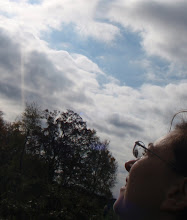Originally posted at my other blog, Crunchy-Chewy Mama.
I don't claim to understand exactly what craniosacral therapy (CST) does, but I believe in it. I've read some books by Dr. John Upledger, and I've talked a whole lot with my practitioners about my body and my son's body.
And I've seen its results firsthand.
I've been getting CST for six years, since I first started pursuing alternative therapies, which ended up including diagnoses of celiac disease and autoimmune thyroid disorder en route to dealing with infertility.
I learned about the therapy through my sister and her work with her son, who is on the autism spectrum. CST has been immensely powerful for me, helping me to let go of a whole lot of energy I'd been holding onto, which caused physical and emotional problems. (For more, see my article in the Winter 2008/2009 issue of the Journal of Attachment Parenting).
I had my craniosacral therapist there at my son's birth, which was supposed to be all-natural in a birth center but instead was a c-section due to my baby's breech position and extremely short umbilical cord (see my poem about that in Exhale magazine). So instead, the therapist videotaped the birth, which gave her great insight into how to treat my son hours later. "There's a lot of unwinding in his hips," she said; I later learned breech babies sometimes need to wear harnesses because of their in-utero position (hip dysplaysia).
My son is now 3.5 years old. I schedule CST for him every few months, when it seems like he's just kind of off or working on something I don't know how to address. I'm so grateful that she's been seeing him since he was an infant -- really since even before he was born.
A few months ago I asked the therapist what might have been different if he hadn't been seeing her. I trust her with my life. She does tell some people they don't need to come back. She's never said that to me. "It's hard to tell. Maybe speech or other development issues. Maybe ADD or sensory integration problems."
I've had several different practitioners work on him, and they all say the same things about tight parietal bones and jaw intensity. Lately, E has been chewing on his shirt in a way that disturbs me. A lot of kids have oral fixations, but this one is causing my son's skin to be chapped, and, well, it just looks like an anxious reaction. So I made an appointment.
Usually she just plays with him on the floor with toys while they work in a gentle way. The appointment lasts a full hour. Today, after a while, she invited him up to the table, where she tucked him in. It was the first time I'd ever seen him laid down like a patient. It was a little freaky, but he looked so nurtured and cared for in the soft glow of the massage center room.
She said her recent sensory disorder training recommends letting kids follow their interest/obsession while they are getting treatment. So she did. He chewed on a toy and then, when she felt a big release, he was done with the mouthing and just sort of flopped into relaxation.
After seeing him so manic and wound up recently, it was a real gift to see him so calm under her hands. She explained some other physical things and gave me more ideas for ways to work with his particular needs, including broad and heavy strokes on his body and heavy weight on his legs in front of him, and offering him straws and other mouthing options. Her questions about other behaviors -- "does he seem to need to run full boar into things?" -- seemed so spot on. He's never gotten any kind of diagnosis, and I don't understand all the ins and outs of sensory integration issues and proprioception. But I do feel very good that I have this therapist on my team.
She said that it felt like a phase but like there was also an emotional component that was not yet resolved. His neck and chest were pouring off heat, she said.
I left a little poorer but more resolved to model and live the grounding, solidifying presence he and I both shun but deeply crave.
For more information on CST and children, see "Craniosacral Therapy and Scientific Research, Part II" by John Upledger, DO, OMM. The website for the Upledger Institute is pan style="font-weight:bold;">http://upledger.com/. Find practitioners at http://www.iahp.com/
Tuesday, December 1, 2009
Subscribe to:
Comments (Atom)
